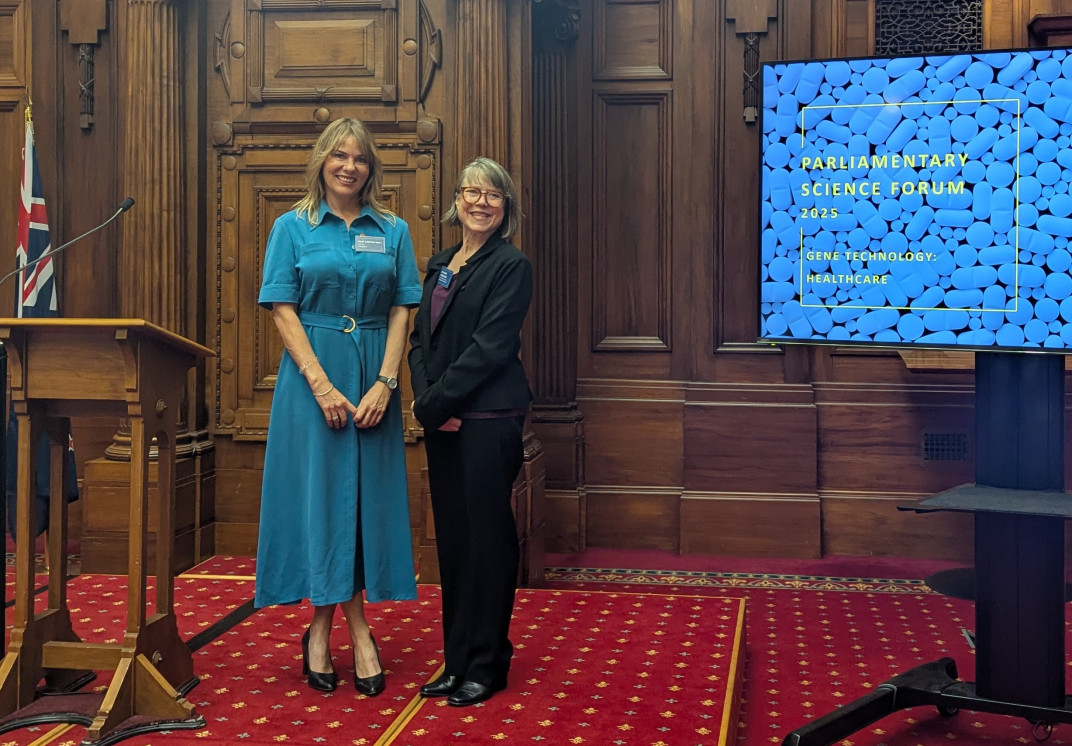Gene technology: Healthcare
The second event in 2025’s Parliamentary Science Forum was held on 5 Poutū-te-rangi March. Dr Hilary Longhurst told MPs about upcoming gene therapy to cure rare genetic diseases and Professor Kjesten Wiig talked about arming our immune cells to fight cancer.

Prof Kjesten Wiig and Dr Hilary Longhurst at Parliament
Gene editing: Lessons from a rare disease
Dr Hilary Longhurst MA FRACP PhD FRCPath, Te Toka Tumai | Auckland City Hospital and Waipapa Taumata Rau | University of Auckland
"Through my work as a Clinical Immunologist, I have been privileged to work with families affected by rare immunological disorders and to experience the power of an engaged patient group, when supported by medical staff, scientists and pharmaceutical companies working in concert.
CRISPR-Cas9 gene editing therapy for patients affected by a rare swelling disorder, hereditary angioedema (HAE), has given me insight into the wider potential of gene editing therapies.
HAE is caused by a genetic deficiency which leads to overactivity of a plasma protein called kallikrein which causes inappropriate capillary leakage, particularly at times of physical or emotional stress. This results in unpredictable external or internal angioedema (swelling) which can affect any part of the body, leading to disfigurement, disability and pain, typically lasting a few days. Throat angioedema results in lifetime mortality of 30-40% in untreated people. Angioedema does not respond to conventional therapies, requiring high-cost injectable treatments.
Together with Intellia Therapeutics and New Zealand Clinical Research, we have treated 14 of the first 37 patients in the world to receive kallikrein gene editing treatment (NTLA-2002) for HAE, in Auckland.
NTLA-2002 is a lipid nanoparticle that carries CRISPR machinery to the liver. There, CRISPR targets the kallikrein gene and permanently inactivates it. Loss of functional kallikrein has no ill effects for patients and the treatment is highly effective and safe.
After receiving NTLA-2002, patients are angioedema-free. Other than a corticosteroid premedication, immunosuppression is not required: the treatment, given as a one-time intravenous infusion, is well-tolerated.
CRISPR-Cas9 therapy can be modified to treat other parts of the body, and to repair, insert or reversibly silence genes. Technology for manufacturing such RNA-containing nanoparticles is already in existence and is cheap - a few dollars per patient.
Similar treatment trials are planned or ongoing for other rare and common disorders, which otherwise would have resulted in need for ongoing health care, morbidity and mortality (transthyretin amyloidosis, a-1 antitrypsin deficiency, hyperlipidaemia, thalassemia and hepatitis B).
CRISPR-Cas9 offers hope to the 300,000 New Zealanders and their whanau living with rare disorders - mostly (80%) genetic. However, political leadership will be required to ensure that the regulatory legislation facilitates development of these revolutionary, cost-effective therapies."
Re-directing immune cells against cancer: The Malaghan Institute’s quest to save New Zealanders’ lives
Professor Kjesten Wiig, Malaghan Institute of Medical Research
Professor Kjesten Wiig, the new director of the Malaghan Institute of Medical Research, discussed the institute’s ground-breaking research into Chimeric Antigen Receptor (CAR) T-cell therapy and its efforts to give New Zealanders access to this cutting-edge cancer treatment.
She shared the Malaghan’s cancer research in the context of its focus on the immune system and its potential to be harnessed to prevent, treat and cure disease. She spoke on Malaghan’s work as an independent charity across fundamental research through to clinical trials and healthcare integration.
The Malaghan is focused on developing technologies that stimulate strong immune responses against cancer cells, through better understanding the way the immune system programmes immune cells to attack tumours.
CAR T-cell therapy is one such therapy – a gene-modifying technology which uses our own immune system to fight cancer. CAR T-cell therapy is a one-off treatment of curative potential for certain blood cancers, with active research internationally advancing its potential for solid cancers and autoimmune diseases like lupus. While there are seven FDA approved CAR T-cell therapies available globally, no CAR T-cell therapies are currently licensed or funded in New Zealand.
Prof Wiig spoke of how the Malaghan Institute is working to change that. Since bringing CAR T-cell to New Zealand for the first time with the ENABLE phase 1 clinical trial in 2019, the Malaghan Institute has been driven by the goal of making this cancer immunotherapy a standard of care in New Zealand hospitals. The Malaghan has seized the opportunity to break new ground, to establish the manufacturing, regulatory and clinical capability to develop and deliver CAR T-cell therapy in New Zealand and pave a new way of bringing innovative new treatments to New Zealanders.
She shared results of the phase 1 trial treating 30 patients with relapsed and refractory B-cell non-Hodgkin lymphoma which showed no neurotoxicity or severe cytokine release syndrome – common side effects of some commercial CAR T-cell therapies – and promising effectiveness, with around half of the participants’ lymphomas in complete response three months after receiving the treatment.
On the back of promising phase 1 trial results, a phase 2 trial – ENABLE-2 – is underway, treating 60 patients over two years at trial sites in Wellington, Auckland and Christchurch. Due to the safety profile, patients can be treated earlier in cancer progression and as outpatients. BioOra Limited, a start-up company incubated at the Malaghan, will provide automated manufacturing and delivery of CAR T-cells. The trial has been designed to address primary unmet need in New Zealand, facilitate registration by Medsafe and upskill our hospital services.
Prof Wiig said changes to the gene editing regulations would bring New Zealand up-to-date with other jurisdictions and speed up research into and access to life-changing therapies. While she acknowledged the Malaghan was able to trial its CAR T-cell therapy under the current regime, approval for this and other research involving genetic modification has delayed progress, despite low risk, with significant costs and impact on research.
